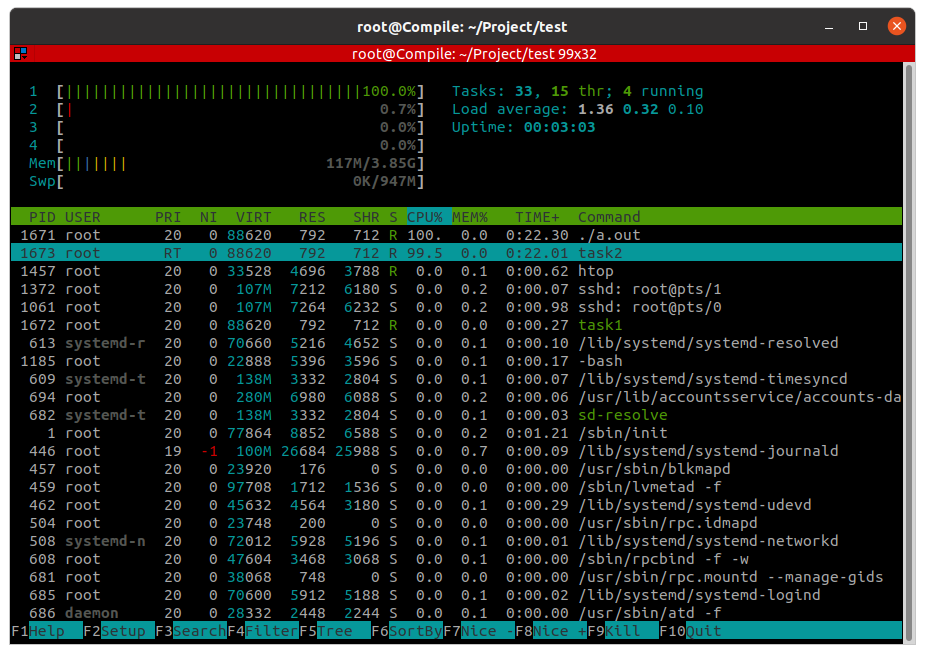Code Tips: 线程读写锁自旋导致的死循环
发现问题
项目测试的时候,发现运行一段时间后会出现cpu百分之百的情况。
想着可能是哪里出现了死循环,于是打算用gdb跟一下,结果gdb居然无法attach到进程。
定位问题
查了查去,原来有一个优先级为RT的实时线程出现了死循环,并且由于配置了CPU的亲和属性,使得进程只运行在第一个核上,此时gdb就无法attach了
使用taskset现场修改进程的cpu亲和属性后,发现这个占cpu百分百的实时线程并没有出现一般的死循环,而是每次都在pthread_rwlock_wrlock这个函数中,
而更诡异的是,只要修改了cpu亲和属性,就没有“死循环了”。
实验
于是写了一段实验代码
1 #define _GNU_SOURCE 2 #include "stdio.h" 3 #include "stdlib.h" 4 #include "unistd.h" 5 #include "pthread.h" 6 #include <sched.h> 7 8 pthread_rwlock_t rwlock; 9 10 void* task1(void *arg) 11 { 12 pthread_setname_np(pthread_self(), "task1"); 13 14 while(1) 15 { 16 printf("\r\n task1 lock \r\n"); 17 pthread_rwlock_wrlock(&rwlock); 18 19 printf("\r\n task1 unlock \r\n"); 20 pthread_rwlock_unlock(&rwlock); 21 22 usleep(100); 23 } 24 } 25 26 void* task2(void *arg) 27 { 28 struct sched_param sparam; 29 30 pthread_setname_np(pthread_self(), "task2"); 31 32 /* 设置为最高优先级的实时任务 */ 33 sparam.sched_priority = sched_get_priority_max(SCHED_RR); 34 pthread_setschedparam(pthread_self(), SCHED_RR, &sparam); 35 36 while(1) 37 { 38 printf("\r\n task2 lock \r\n"); 39 pthread_rwlock_wrlock(&rwlock); 40 41 printf("\r\n task2 unlock \r\n"); 42 pthread_rwlock_unlock(&rwlock); 43 44 usleep(100); 45 } 46 } 47 48 int main(int argc, char *argv[]) 49 { 50 pthread_t t1, t2, t3; 51 cpu_set_t cpuset; 52 53 /* 设置cpu亲和属性,将进程绑定在第一个核上 */ 54 CPU_ZERO(&cpuset); 55 CPU_SET(0, &cpuset); 56 sched_setaffinity(0, sizeof(cpuset), &cpuset); 57 58 pthread_rwlock_init(&rwlock, NULL); 59 60 pthread_create(&t2, NULL, task1, NULL); 61 sleep(3); 62 pthread_create(&t3, NULL, task2, NULL); 63 64 while (1) 65 sleep(10); 66 67 return 0; 68 }
运行结果,如下图

真的出现了CPU百分百的情况!!!
分析原因
1. 读写锁的“拿锁”和“放锁”操作并不是一个完整的原子操作,而是有可能操作到一半被调度出去;
2. 此次实验结果显示,task1(非实时)在做unlock操作时,已经修改了一部分读写锁的属性,此时task2(实时)lock时,发现不需要再阻塞了,只需要自旋等待(死循环)task1将unlock操作做完;然而由于task2是实时任务,整个进程又只绑定到了第一个核上,task1无法得到调度,造成了task2的死循环。



 浙公网安备 33010602011771号
浙公网安备 33010602011771号